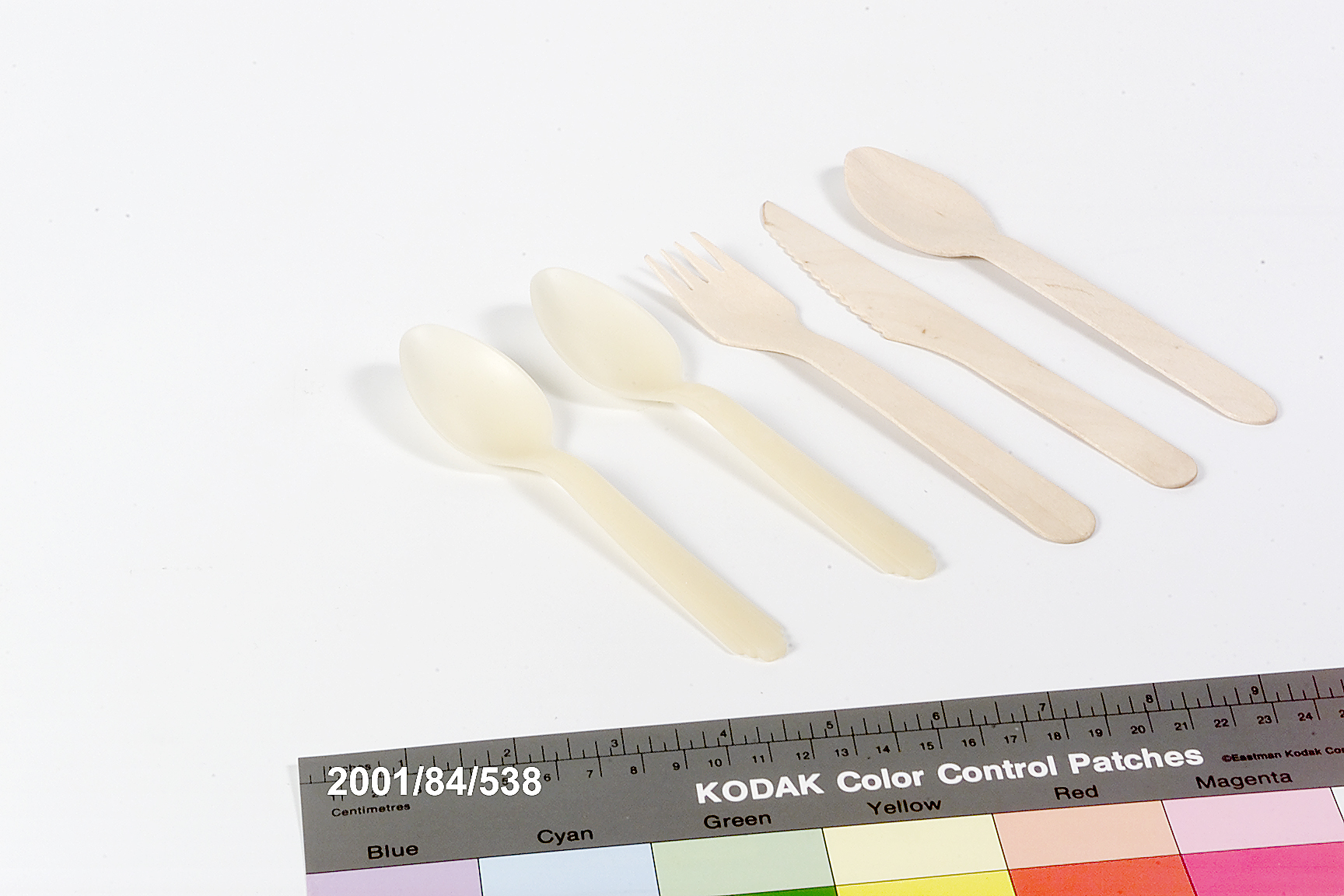
Cutlery for the Sydney Olympic and Paralympic Games
Object No. 2001/84/538
From 1995, SOCOG developed an ambitious environmental agenda to recycle and compost up to 80 per cent of all waste arising from the Sydney 2000 Games. (The remaining 20 per cent would be destined for landfill.) This agenda, called The Sydney 2000 Integrated Waste Management Solution, was part of Sydney's promise to deliver the first eco-friendly Olympic Games. The Sydney 2000 Integrated Waste Management Solution was an holistic approach to waste management. Disposable products, ranging from food packaging to building materials, would be recyclable or bio-degradable, and waste management stations (three large, colour- coded bins for the collection of biodegradable and recyclable material) would be installed for public use at all Olympic venues. From here, refuse would be taken to extensive bio-waste facilities or to recycling centres built especially for the Games. Around 5000 tonnes of waste passed through the Sydney's Auburn Waste Transfer Station during each week of the Sydney 2000 Games. Recyclable material was then transferred to a waste management centre at Narellan, and compostable material was sent to a second centre at Eastern Creek. The Eastern Creek Waste Management Centre processed an up to 60 tonnes of compost material during each day of the Games. This material was combined with shredded green waste, turned and watered regularly, and left until May 2001 to ferment. It was then screened for non-degradable material, and prepared for sale at horticultural markets in Sydney. To supplement this waste management system, SOCOG sought out new ranges of recyclable and biodegradable cutlery and food packaging. Cardboard cups and food containers, paper food wrap, cornstarch cutlery, and sugar-cane fibre plates became standard items at Olympic food outlets. After use, they were deposited in maroon bins at waste stations, and transferred to Eastern Creek for composting. Cardboard boxes were also stationed around administrative areas to collect general waste and recyclable materials. Approximately 5000 tonnes of waste passed through the Sydney's Auburn Waste Transfer Station during each week of the Sydney 2000 Games. From here, recyclable material was transferred to a waste management centre at Narellan, and compostable material was sent to a second centre at Eastern Creek. The Eastern Creek Waste Management Centre processed an up to 60 tonnes of compost material during each day of the Games. This material was combined with shredded green waste, turned and watered regularly, and left until May 2001 to ferment. At this time, it was screened for any non- degradable material, and prepared for sale at horticultural markets around Sydney. These items - cornstarch spoons, and wooden knife, fork and spoon - are examples of the biodegradable cutlery that appeared at all Olympic food outlets. The German company, Mater-Bi, designed and manufactured this material in 2000 for Visy, which supplied the recyclable or compostable cutlery and food packaging at the Games. Approximately 6 million pieces of cutlery were manufactured for the Sydney 2000 Games though only 4.5 million were used. Due to its design, manufacture and prevalence throughout the Games, this cutlery demonstrates the contemporary innovations within eco- design, and as well as SOCOG's serious attempt to deliver the inaugural 'Green Games'.
Loading...
Summary
Object Statement
Cutlery (5), wood, corn flour, Green Games, Sydney 2000 Olympic and Paralympic Games, made by Mater-Bi, supplied to SOCOG by Biocorp, Sydney, 2000
Physical Description
Cutlery (5), wood, corn flour, Green Games, Sydney 2000 Olympic and Paralympic Games, made by Mater-Bi, supplied to SOCOG by Biocorp, Sydney, 2000 Cutlery, 5 pieces, 3 wooden pieces of cutlery - a knife fork and spoon and 2 corn flour spoons.
PRODUCTION
Notes
Designed by Mater-Bi, Germany c.2000 Made by Mater-Bi, Germany and supplied to SOCOG by Bicorp, Sydney c.2000
HISTORY
Notes
Unused Made for and owned by the Olympic Coordination Authority/Sydney Organising Committee for the Olympic Games, and donated to the Powerhouse Museum after use in the Games.
SOURCE
Credit Line
Part of the Sydney 2000 Games Collection. Gift of the New South Wales Government, 2001
Acquisition Date
5 October 2001

Copyright for the above image is held by the Powerhouse and may be subject to third-party copyright restrictions. Please submit an Image Licensing Enquiry for information regarding reproduction, copyright and fees. Text is released under Attribution-Non Commercial-No Derivative licence.
Image Licensing Enquiry
Object Enquiry